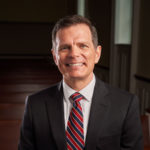
C. S. Lewis on the Inner Ring
One of the terms that has become popular in recent years is the deep state. In other words, people recognize that there is the recognized government, the executive, legislative, and judicial branches, but that at a deeper level there is a group of people and institutions that truly make the decisions and run things. Whether there is a deep state or not is best left to historians and political pundits, but the truth of the matter is that most schools, churches, businesses, and organizations have what C. S. Lewis called, inner rings. Perhaps you’ve seen this phenomenon in a church. The church has its pastor and elders who are supposed to be the group that makes the decisions in the church, but in reality, there is a smaller group of people that really make the decisions. They are the ones who wield the real influence and power within the church. In my own experience, I can tell you that such inner rings exist—I have seen and continue to see the inner rings make influential decisions.There is a big difference between seeking membership in an inner circle to gain influence and power, and another to pursue excellent work and be recognized for it. Share on X
In all honesty, there was a time when I desperately wanted to be a part of such inner rings. I wanted to be on the other side of the closed door deliberating, deciding, and directing. But Lewis cautions against this temptation. He warns that our desire to be a part of the inner ring might cause us to set aside our morals. We’re so desperate to be a part of the inner ring that when they approach and ask you to bend a rule, look the other way for just a moment, or participate in their well-intentioned but off-the-books plan, that you’ll compromise your principles as your price of admission. The problem, Lewis explains, only compounds itself as time goes by. Compromise gives way to immorality and before you know it, you’re a scoundrel, Lewis writes.
There is a different sort of inner ring that Lewis identifies, namely, the group of people who excel at a certain skill or quality. It’s one thing to seek membership in a group that bends rules to promote an off-the-books agenda, and entirely another to have a group recognize your skill as an exegete and ask you to participate in a conference. You become part of an inner ring because you live out the very best principles and exemplify excellence, not because you’ve compromised your morals. In fact, when you’ve been accepted into an inner ring of excellence, you often don’t even realize it. There is a big difference between seeking membership in an inner circle to gain influence and power, and another to pursue excellent work and be recognized for it.
Beware of inner rings and avoid them at all costs. As tempting as it might be to side on the other side of the closed door where the real decision-making goes on, better to be on the outside with your integrity intact than on the inside beset by compromise and well on the path to becoming a scoundrel.
You can find Lewis’s essay on inner rings here. It’s definitely well worth the read.
This post was originally published on Dr. Fesko’s Blog.
Image by Mircea Iancu from Pixabay

